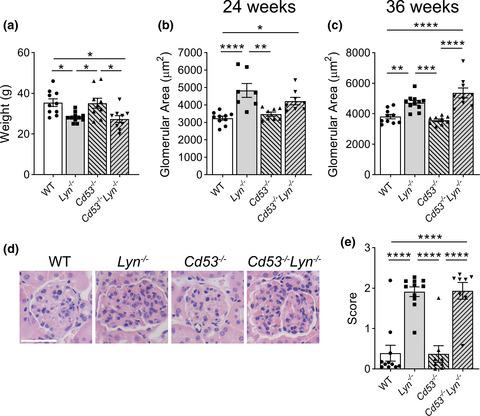当前位置:
X-MOL 学术
›
Immunol. Cell Biol.
›
论文详情
Our official English website, www.x-mol.net, welcomes your feedback! (Note: you will need to create a separate account there.)
Tetraspanin CD53 modulates lymphocyte trafficking but not systemic autoimmunity in Lyn-deficient mice
Immunology and Cell Biology ( IF 4 ) Pub Date : 2021-09-12 , DOI: 10.1111/imcb.12501 Louisa Yeung 1, 2 , Timothy A Gottschalk 2 , Pam Hall 1 , Evelyn Tsantikos 2 , Rebecca H Gallagher 1, 2 , A Richard Kitching 1, 3 , Margaret L Hibbs 2 , Mark D Wright 2 , Michael J Hickey 1
Immunology and Cell Biology ( IF 4 ) Pub Date : 2021-09-12 , DOI: 10.1111/imcb.12501 Louisa Yeung 1, 2 , Timothy A Gottschalk 2 , Pam Hall 1 , Evelyn Tsantikos 2 , Rebecca H Gallagher 1, 2 , A Richard Kitching 1, 3 , Margaret L Hibbs 2 , Mark D Wright 2 , Michael J Hickey 1
Affiliation

|
The leukocyte-restricted tetraspanin CD53 has been shown to promote lymphocyte homing to lymph nodes (LNs) and myeloid cell recruitment to acutely inflamed peripheral organs, and accelerate the onset of immune-mediated disease. However, its contribution in the setting of chronic systemic autoimmunity has not been investigated. We made use of the Lyn−/− autoimmune model, generating Cd53−/−Lyn−/− mice, and compared trafficking of immune cells into secondary lymphoid organs and systemic autoimmune disease development with mice lacking either gene alone. Consistent with previous observations, absence of CD53 led to reduced LN cellularity via reductions in both B and T cells, a phenotype also observed in Cd53−/−Lyn−/− mice. In some settings, Cd53−/−Lyn−/− lymphocytes showed greater loss of surface L-selectin and CD69 upregulation above that imparted by Lyn deficiency alone, indicating that absence of these two proteins can mediate additive effects in the immune system. Conversely, prototypical effects of Lyn deficiency including splenomegaly, plasma cell expansion, elevated serum immunoglobulin M and anti-nuclear antibodies were unaffected by CD53 deficiency. Furthermore, while Lyn−/− mice developed glomerular injury and showed elevated glomerular neutrophil retention above than that in wild-type mice, absence of CD53 in Lyn−/− mice did not alter these responses. Together, these findings demonstrate that while tetraspanin CD53 promotes lymphocyte trafficking into LNs independent of Lyn, it does not make an important contribution to development of autoimmunity, plasma cell dysfunction or glomerular injury in the Lyn−/− model of systemic autoimmunity.
中文翻译:

Tetraspanin CD53 调节淋巴细胞运输,但不调节 Lyn 缺陷小鼠的全身性自身免疫
白细胞限制性四跨膜蛋白 CD53 已被证明可促进淋巴细胞归巢到淋巴结 (LN) 和骨髓细胞募集到急性发炎的外周器官,并加速免疫介导的疾病的发作。然而,尚未研究其在慢性全身性自身免疫病中的作用。我们利用Lyn -/-自身免疫模型,生成Cd53 -/- Lyn -/-小鼠,并将免疫细胞运输到次级淋巴器官和全身性自身免疫疾病的发展与单独缺乏任一基因的小鼠进行比较。与之前的观察结果一致,CD53 的缺失通过 B 和 T 细胞的减少导致 LN 细胞数量减少,在Cd53 -/- 中也观察到了这种表型Lyn -/-小鼠。在某些情况下,Cd53 -/- Lyn -/-淋巴细胞表现出的表面 L-选择素和 CD69 上调损失比单独由 Lyn 缺乏引起的更大,表明这两种蛋白质的缺失可介导免疫系统中的累加效应。相反,Lyn 缺陷的原型效应包括脾肿大、浆细胞扩增、血清免疫球蛋白 M 升高和抗核抗体不受 CD53 缺陷的影响。此外,虽然Lyn -/-小鼠发生肾小球损伤并显示肾小球中性粒细胞保留高于野生型小鼠,但Lyn -/- 中不存在 CD53小鼠没有改变这些反应。总之,这些发现表明,虽然四跨膜蛋白 CD53 促进淋巴细胞转运到 LN 中而不依赖于 Lyn,但它对系统性自身免疫的Lyn -/-模型中的自身免疫、浆细胞功能障碍或肾小球损伤的发展没有做出重要贡献。
更新日期:2021-11-09
中文翻译:

Tetraspanin CD53 调节淋巴细胞运输,但不调节 Lyn 缺陷小鼠的全身性自身免疫
白细胞限制性四跨膜蛋白 CD53 已被证明可促进淋巴细胞归巢到淋巴结 (LN) 和骨髓细胞募集到急性发炎的外周器官,并加速免疫介导的疾病的发作。然而,尚未研究其在慢性全身性自身免疫病中的作用。我们利用Lyn -/-自身免疫模型,生成Cd53 -/- Lyn -/-小鼠,并将免疫细胞运输到次级淋巴器官和全身性自身免疫疾病的发展与单独缺乏任一基因的小鼠进行比较。与之前的观察结果一致,CD53 的缺失通过 B 和 T 细胞的减少导致 LN 细胞数量减少,在Cd53 -/- 中也观察到了这种表型Lyn -/-小鼠。在某些情况下,Cd53 -/- Lyn -/-淋巴细胞表现出的表面 L-选择素和 CD69 上调损失比单独由 Lyn 缺乏引起的更大,表明这两种蛋白质的缺失可介导免疫系统中的累加效应。相反,Lyn 缺陷的原型效应包括脾肿大、浆细胞扩增、血清免疫球蛋白 M 升高和抗核抗体不受 CD53 缺陷的影响。此外,虽然Lyn -/-小鼠发生肾小球损伤并显示肾小球中性粒细胞保留高于野生型小鼠,但Lyn -/- 中不存在 CD53小鼠没有改变这些反应。总之,这些发现表明,虽然四跨膜蛋白 CD53 促进淋巴细胞转运到 LN 中而不依赖于 Lyn,但它对系统性自身免疫的Lyn -/-模型中的自身免疫、浆细胞功能障碍或肾小球损伤的发展没有做出重要贡献。



























 京公网安备 11010802027423号
京公网安备 11010802027423号